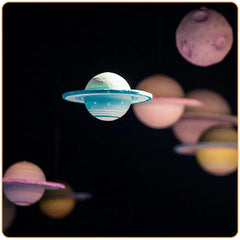Symbolic of the number 108 found in the mala

The meaning of the number 108 is open to interpretation. Over time, it has been attributed with great spiritual and scientific significance. For many, 108 is a sacred number . While it may seem arbitrary, it actually holds great significance in mathematics, astronomy, and astrology. It is also an auspicious number with a long history in many spiritual traditions, including Buddhism, Yoga, Hinduism, and Sikhism. Most notably, 108 represents the number of beads to count in a traditional mala. While you don't need to understand the meaning of this number, it can be helpful and interesting to know when using your mala beads.
See our collection of mala necklaces and bracelets
Mala of 108 beads
In Hinduism and Buddhism, a mala is a rosary of 108 beads plus a guru or guide bead (a mala resembles a Catholic rosary and is used for counting when repeating a mantra). When using a mala, it's helpful to understand the significance of its 108 beads. The guru bead should not be used for counting. There are ten main interpretations of the meaning and significance of the number 108. What's most fascinating is that this magical number appears in a multitude of ancient cultures, traditions, and disciplines. While it's not necessary to believe in it when using prayer beads , they can infuse your spiritual practice with more magic, power, and intention.
The chakras
The chakras are the intersections of energy lines, and it is said that there are a total of 108 energy lines that converge to form the heart chakra . One of these, the sushumna, leads to the crown chakra and is considered the path to self-realization.
Astronomy
The diameter of the sun is approximately 108 times that of the earth, and the distance between the sun and the earth is 108 times the diameter of the sun . We can draw a parallel with the moon: its average distance from the Earth is 108 times the diameter of the moon.

Astrology
There are 12 houses and 9 planets which, multiplied together, give 108. It is said that the Earth has an astrological cycle of 2160 years, which, divided by 20, gives 108. There are also 27 “lunar mansions” in Vedic astrology and each of them has 4 elements or directions, which, multiplied together, make 108.
Mathematics
Mathematicians value the number 108 for its myriad patterns and potential divisions. In Sanskrit, 108 is a Harshad number ("great joy"), meaning an integer divisible by the sum of its digits. It is also an abundant number (a number smaller than the sum of its proper divisors), a semiperfect number (equal to the sum of all or some of its proper divisors), a remanufacturable number (divisible by the total number of its divisors), and a proper number (cannot be written as the sum of the digits of any other integer). The pentagon is a sacred symbol in many cultures, and its interior angles are 108 degrees. 108 is also related to the golden ratio and the Fibonacci sequence.
Yoga
The yogic tradition describes 108 nadis (energy channels or pathways) connected to the heart chakra. Connecting one of these, the sushumna nadi, to the crown chakra is considered a path to self-realization. The 12 yoga asanas of the sun salutations are often performed in nine sets, totaling 108 movements. Pranayama (yogic breathing) is frequently practiced in cycles of 108, and it is believed that enlightenment can be attained by remaining so still in meditation that one takes only 108 breaths per day.
Meditation on 1, on 0, and on 8
Vedic tradition views the number 108 as a reflection of the universe, and meditating on it can reveal spiritual truths. The digit 1 represents concentration , determination, willpower, and the Atman (the higher truth); 0 symbolizes emptiness or unity with the universe; and 8 symbolizes infinity or eternity. The number 8 is also believed to bring good fortune, success, prosperity, and abundance.
Ayurveda
In traditional Indian medicine, Ayurveda, there are 108 sacred energy points , or marmas, on the body. These marma points are the intersection of matter and consciousness and can be used to awaken and align vital energy and heal the body.
Sacred texts
The sacred texts of Eastern philosophy often mention the number 108, either as a symbol of divinity or as a means of attaining it. The number 108 is found in the number of hymns in the Rig Veda, one of the most sacred Hindu texts . Furthermore, there are 108 primary Tantras and 108 Upanishads.

Hinduism
The number of Hindu deities is 108, and each has 108 divine names. Hindus believe that it takes 108 lifetimes for the soul to reach nirvana. There are 108 Pithas , or sacred sites, scattered throughout India. These pilgrimage sites are all located near a body of water imbued with the energy of the goddess associated with it.
The Sanskrit alphabet
The Sanskrit alphabet has 54 letters, each having a quality of Shakti (feminine) and Shiva (masculine), giving a total of 108.
Buddhism
The number 108 is associated with many auspicious things in Buddhism and represents peace, harmony, and spiritual fulfillment. There are 108 illusions or mental poisons . These are the pleasures and passions of the world that can trap us and obscure our reality, such as envy, hostility, inattention, lying, pride, greed, and unkindness. Buddhist temples often have 108 steps, symbolizing the 108 stages toward enlightenment. At the end of the year, a bell is rung 108 times in Zen Buddhist temples. Buddhists are also considered lucky when they carve 108 small Buddhas onto a walnut.
Boost your positive energy, focus your mind, and cultivate peace, joy, clarity, and compassion with one of our 108-bead malas . Our mala beads are durable, crafted from sacred stones and woods. Each bead of the mala can be a powerful reminder of the sacred meanings of the number 108.

À propos de l'auteur : Elara Vey
Passionnée par les traditions ancestrales et les pratiques de bien-être, Elara partage pour Kaosix ses découvertes pour vous aider à intégrer plus d'harmonie et de sens dans votre quotidien.
Découvrir son parcours →

